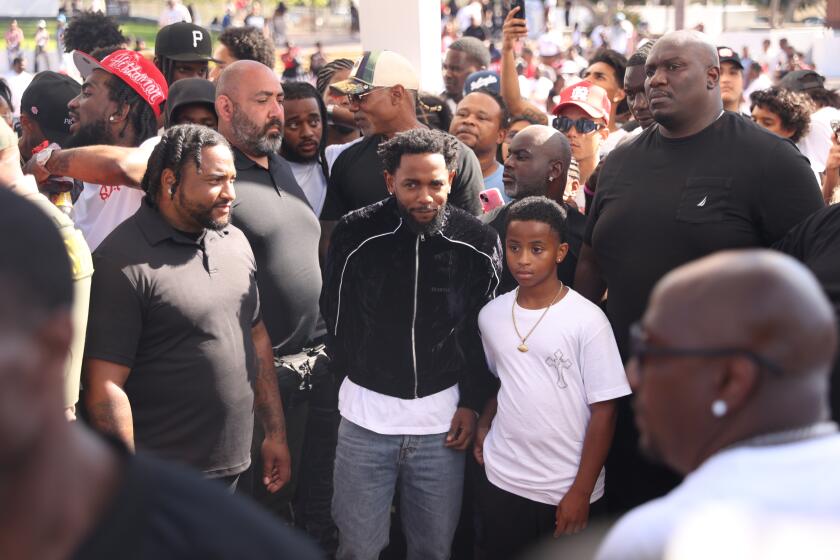Cooley Scorns Report on Police Prosecutions
Los Angeles County Dist. Atty. Steve Cooley on Wednesday lashed out at criticism that his office rejects the majority of criminal filings against Los Angeles police and sheriff’s deputies, saying in a prepared statement that he would not “prosecute cases to please the public.”
But officials, activists and attorneys said the critique in a report by Merrick J. Bobb, special counsel to the Los Angeles County Board of Supervisors on the Sheriff’s Department, showed a double standard.
“When it’s an ordinary citizen, the philosophy is let the jury decide and when it’s a police officer, the philosophy is let [Assistant Dist. Atty.] Curt Hazell decide,” said Gigi Gordon, a court-appointed defense attorney who represents alleged victims of police corruption. “And what is he deciding? He is deciding whether they are going to look good. That’s a political decision.”
In his report, Bobb found that Cooley had accepted 25% of the criminal cases the LAPD and Sheriff’s Department presented in 2004 against their own officers. In contrast, the office in 2002 prosecuted 75% of the general cases investigated by those departments, according to state Department of Justice statistics.
Khalid Shah, a longtime anti-gang activist and chairman of the Los Angeles City and County Reconciliation Coalition, said the report underscored a continuing perception in minority communities that “there is a one-sidedness to the way the district attorney utilizes his discretion to prosecute.”
“That doesn’t necessarily mean that’s the way it’s done or that it reflects the facts because we don’t know all the facts,” Shah said. “But at least for the average guy on the street, perception is reality.”
Cooley declined to be interviewed by The Times. But in his statement, he assailed Bobb for suggesting that prosecutors were reluctant to file on officers.
“The standard to file a criminal case should be high to prevent misuse of the criminal justice system by those who believe that the law should be making a social statement instead of protecting the public,” Cooley said. “Those accused of crimes -- be it civilian or law enforcement officer -- have a right to a fair and independent evaluation of the evidence by a public prosecutor who will make a filing decision based solely on the evidence and not on public opinion.”
Cooley added that he would not “set aside ethical guidelines and file cases just because Mr. Bobb has an agenda that is inconsistent with the pursuit of fairness and justice.”
He also attacked Bobb for singling out three of 300 rejected cases for special mention.
The three cases involved Los Angeles County sheriff’s deputies -- one was accused of lying in a criminal case, a second involved the alleged theft of $6,000 from an inmate in jail and the third alleged that a detention officer had sex with a female inmate.
The district attorney’s office released internal records Wednesday detailing why it declined to prosecute those cases.
In the perjury case, prosecutors said, there was insufficient evidence to prove that Deputy Neal Levang lied when he testified that he was present during a witness identification. After prosecutors rejected the case, Levang told supervisors that he had made a mistake in his testimony. There is no evidence that the Sheriff’s Department asked prosecutors to reconsider filing charges against Levang after his admission.
In the jail sex case, prosecutors concluded that there was no physical evidence and that the inmate’s long criminal history would make her an unreliable witness. Another inmate who was willing to testify that she and the officer had sex in the jail also had a long criminal record, prosecutors said.
In the theft case, prosecutors said that Deputy Scott Galloway asked to be represented by a lawyer when questioned about the missing money. His signature was on a property form indicating that he had taken custody of the $6,000 from the San Bernardino County sheriff’s deputy who arrested the inmate. But prosecutors said there was no independent witness. “Although the finger of suspicion points in Deputy Galloway’s direction, there is insufficient evidence to file charges against him,” prosecutors wrote.
Richard E. Drooyan, a former federal prosecutor who helped examine both the 1991 Rodney G. King beating and the Rampart scandal, said it was hard to draw conclusions from the limited details in Bobb’s report.
“You can’t make an apples-to-apples comparison because some of the cases that are reviewed by the district attorney are unique to police officers,” Drooyan said.
Drooyan said police departments sometimes forward weak cases so that they can be double-checked by an independent agency. Crimes in the line of duty are difficult to prove because officers are allowed to use force to subdue suspects or to protect themselves and the public, he said.
“Those are tough questions,” Drooyan said.
LAPD Inspector General Andre Birotte said prosecutors may face tough questions, but they also have to make tough calls.
“We all acknowledge that prosecutions against police officers have been historically difficult,” Birotte said. “However, if we are going to send a message that this kind of conduct will not be tolerated, and if there is sufficient evidence to support a conviction, let a jury decide irrespective of whether the case is deemed ‘winnable.’ ”
Los Angeles Police Commission President John W. Mack called the Bobb report “very disturbing.”
“This is not someone just yelling off the street, it’s evidence that had been accumulated and turned over by the law enforcement agencies,” Mack said.
*
Times staff writer Stuart Pfeifer contributed to this report.
More to Read
Sign up for Essential California
The most important California stories and recommendations in your inbox every morning.
You may occasionally receive promotional content from the Los Angeles Times.










